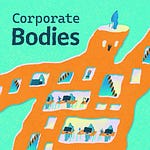What might lie beyond the corporation?
In the previous episode (Death, with Louise Armstrong) we explored how the end of an organisation could liberate the people and resources within it to do new things. In this episode, Kate and Mark consider whether we might move beyond the idea of the corporate body entirely, and explore what other ways we might organise collectively.
They are joined by Esther Foreman from Social Change Nest to talk about the potential for thinking about organising collectively as more like an ecosystem than a human body. They discuss how such a shift might need us to become more comfortable with mess and death, how we might need different rituals for marking endings and setting boundaries, and how we need to think differently about our own roles as individuals and about the sort of infrastructure a post-corporate world might require.
Resources:
The article accompanying the episode is here.
Esther’s organisations
Mycelial networks resources
The Overstory by Richard Powers – novel
Bioneers: The Universe Beneath Our Feet: Mapping the Mycelial Web of Life – podcast episode
Suzanne Simard – researcher on forest ecology and plant intelligence
Kew Carbon Garden – exhibition
Follow us: at
… or wherever you get your podcasts.
Email us: at corporatebodiespodcast@gmail.com
Presenters:
Kate Swade (she/her), independent organisational development and governance consultant
Mark Walton (he/him), Founder and Director, Shared Assets
Interviewee:
Esther Foreman, Chief Encouragement Officer, The Social Change Nest CIC
Editor: Katie Revell (she/her)
Artwork: Hanna Norberg-Williams (they/them)
Supporters:
The series is supported by the Centre for the Understanding of Sustainable Prosperity (CUSP), which is a cutting edge research organisation based at the University of Surrey. CUSP explores the question: What does prosperity mean in a world of environmental, social, and economic limits? For more details, visit cusp.ac.uk.
















Share this post